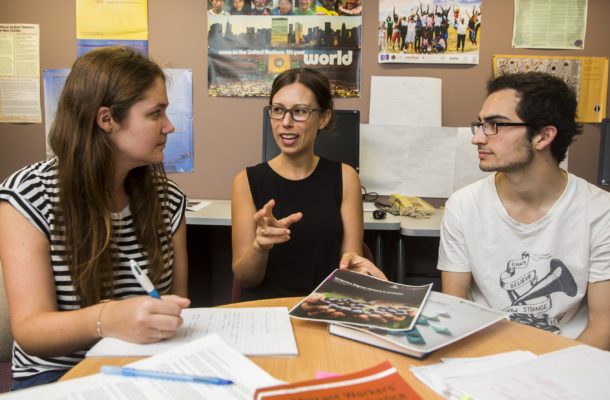UNSW law students release international guide to protect migrant workers

A ground-breaking guide compiled by UNSW Sydney law students is providing international clarity about who is responsible for protecting the rights of the 150 million migrant workers in the world.
Produced by UNSW’s Human Rights Clinic, the International Obligations Regarding Migrant Workers: A Guide for Countries of Origin details the responsibilities of migrant workers’ home countries to protect their citizens at home and abroad.
This includes ensuring their citizens are not deceived and overcharged by recruiters before they leave home, providing diplomatic services to protect migrants’ rights abroad and assist exploited workers to obtain redress, and obligations to prevent forced labour and human trafficking.
The clinic produced the guide in response to a request from the Indonesian Ministry of Foreign Affairs and civil society organisations in Indonesia. Previously, there was no place for governments of migrants’ home countries such as Indonesia to find a comprehensive overview of their obligations concerning migrant workers under international law.
Diplomats also needed an easily-accessible resource on the obligations of the countries where their migrants worked, across the range of international instruments on human rights, labour rights, trafficking and consular obligations.
The 130-page guide has gained endorsement from previous UN Special Rapporteur on Migrants, Professor Francois Crepeau, who writes that the guide “will considerably help policy-makers in countries of origin to devise international cooperation strategies with countries of transit and destination and rights training programmes for officials”.
“It will also support human rights and labour rights organisations in better preparing migrants for the difficulties of the migration journey and in helping them fight for their rights, through training, advocacy, networking, unionising, administrative procedures or court proceedings,” Crepeau writes.
UNSW Law’s Human Rights Clinic is the first of its kind in Australia, bridging theory and practice by exposing students to the practice of law through work on cutting-edge human rights cases and projects in a global context.
Students in the final stages of their Law degree attend the clinic two days per week and, under faculty supervision, work as legal advisers and advocates for individual clients, NGOs, governments and inter-governmental institutions in Australia, Asia and globally.
Former Clinic student and co-author of the Guide, Henry Wells, says the Human Rights Clinic has been a highlight of his time at law school.
“I learned how human rights are advanced ‘at the coalface’, gained valuable legal experience, sharpened my general practice skills and made a real impact, working on real projects for real clients.”
That real world experience is one of the clinic’s strongest assets, said Clinic Director and Senior UNSW Law Lecturer Bassina Farbenblum.
“We give UNSW Law students the unique opportunity to do the work of an international human rights lawyer for a semester, building skills and critically reflecting on the challenges and responsibilities this entails, while having an impact and creating change for some of the world’s most vulnerable individuals.”
Farbenblum is also Co-Director of the Migrant Worker Justice Initiative and co-author of Wage Theft in Australia, a landmark 2017 study into the exploitation of backpackers, international students and other migrant workers in Australia.
“The UNSW Human Rights Clinic seeks to have an impact on pressing migrant rights issues both globally and in Australia,” says Farbenblum, noting that the clinic is now building on the wage theft work with a report on housing rights violations encountered by international students in Sydney, due for release in late 2018.








